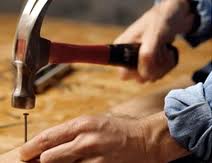.
Sources of Fix-up Houses
For serial home buyers/sellers who utilize the federal tax exemption to pay no capital gains tax, a key to making the process work is to find lower-priced houses in need of repair.
There are good deals to be had even though we just operate on a part-time basis. The pros – the full-time investors – will get eye-popping deals, but there are still enough good left-over deals for us small time operators to get a share of the pie also. It’s like a yard sale. The people who get the huge bargains will be up before dawn, knocking on doors before the yard sales are scheduled to start.
Nevertheless, there are still some bargains left when the rest of us show up a little later in the morning. For my wife and I, finding good fix-up deals primarily involves reading the newspaper, checking the internet, and driving through neighborhoods.
A good source of fix-up houses are those repossessed by banks. These are houses where the owner cannot make the payments on his bank loan and is forced to leave the house when the bank takes it from them. Often the former owner will express his bad feelings toward the bank by destroying fixtures, doors, walls and other parts of the house. While this may give the house an unlivable appearance, most of the damage is fairly easy to repair. This is just the type of house the aspiring handyman investor is looking for, as it has built-in equity because the damage is only superficial.
A second source of good fix-up properties is from the Veteran’s Administration (VA) and Housing and Urban Development (HUD). These properties have had owners who cannot make payments on their loans from these respective organizations, and the VA and HUD have repossessed the houses and put them back on the market. VA and HUD houses are usually offered at a fairly good price, below market if they need serious fix up work done. As in bank repos, the owners have either let their houses run down and are generally in need of, at minimum a paint job, and sometimes a more major fix-up.
My Example
I purchased a VA home, in 2003, in a nice neighborhood that scared off many other investors because there had been water damage to the ceiling in both bathrooms. Upon close examination, I traced the damage to some cracks in the water cooler on the roof. Was it worth it to pay $105,000 for a house in a neighborhood where similar houses sold for $150,000 (and now sell for $200,000)? You bet it was. I could replace the cooler and repair the ceiling for $2,000 to $3,000. The remaining $45,000of equity went to the only person who took the time to climb up on the roof and thoroughly examine the cooler with a flashlight. That was me. HUD, VA and repossessed houses from other federal agencies can be found at the HUD/VA website.
To find bank repos and other fix-up houses, my wife and I carefully scan the newspaper classified ads every day and we spend weekends driving around areas where we might like to buy. We bought our first bank repo by responding to an ad in the newspaper. Based on the ad, it appeared to match all of our requirements, a fix-up house priced at below-market in a nice neighborhood. I visited the property with my handyman friend, made an offer and purchased the property.
To purchase VA and HUD repos, you can also pick up printed listing from real estate agents, some of whom specialize in such sales. Recently repossessed homes are generally listed every two weeks.
Serial Home Sellers, Part 6: Examples

 Subscribe in a reader
Subscribe in a reader
Share this: del.icio.us | Digg | Ma.gnolia | Reddit | Stumble Upon |






